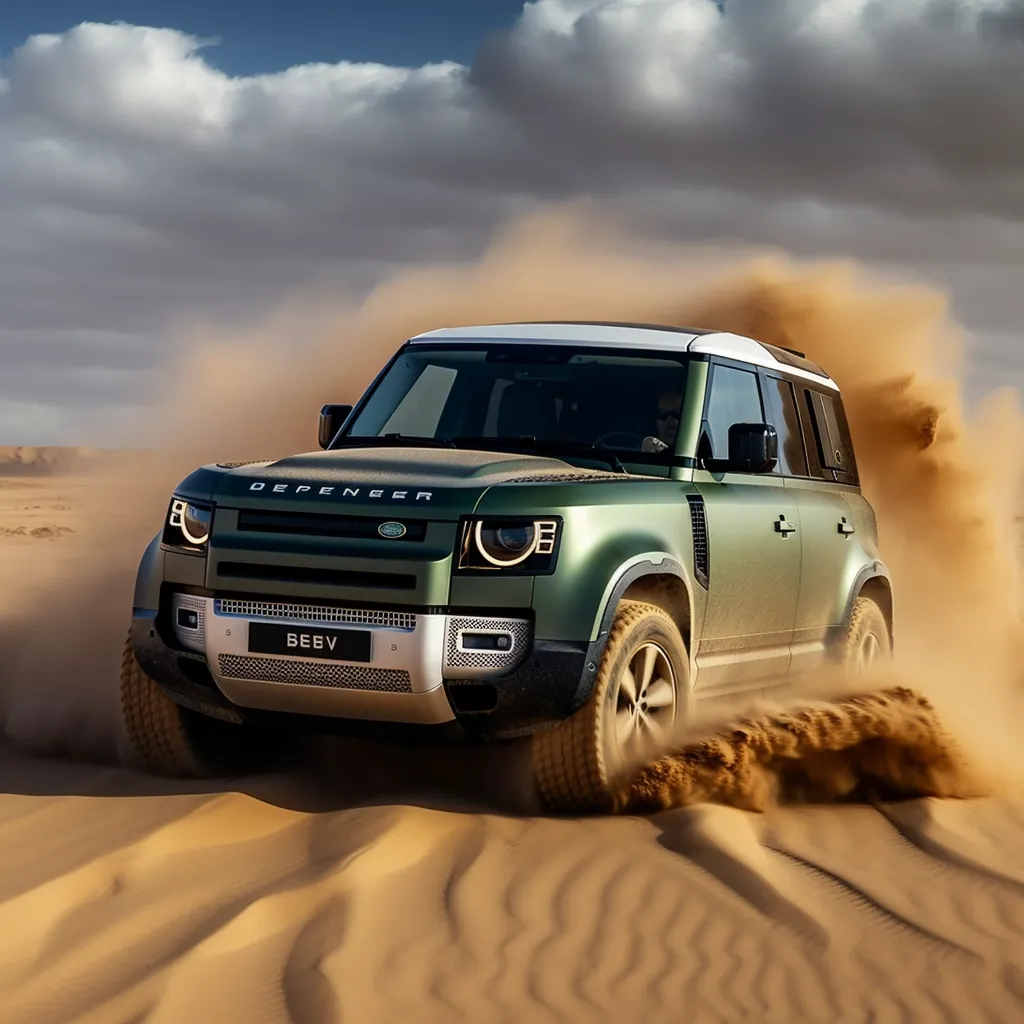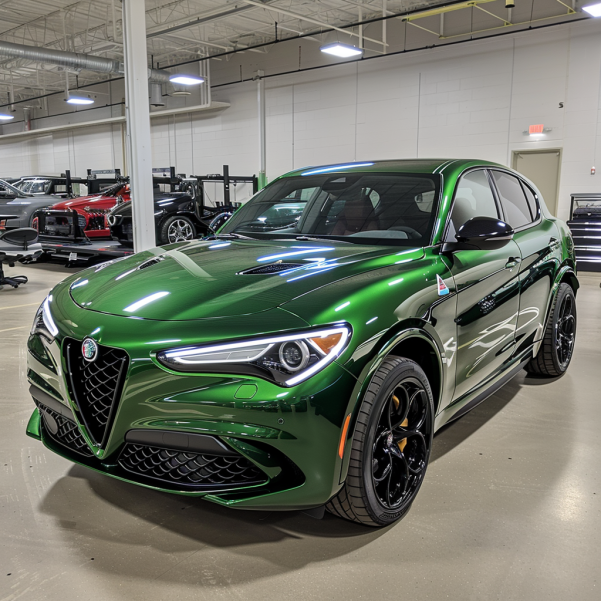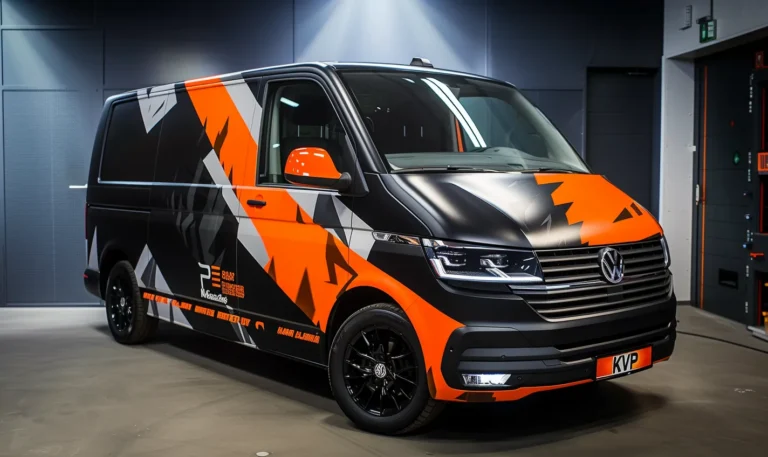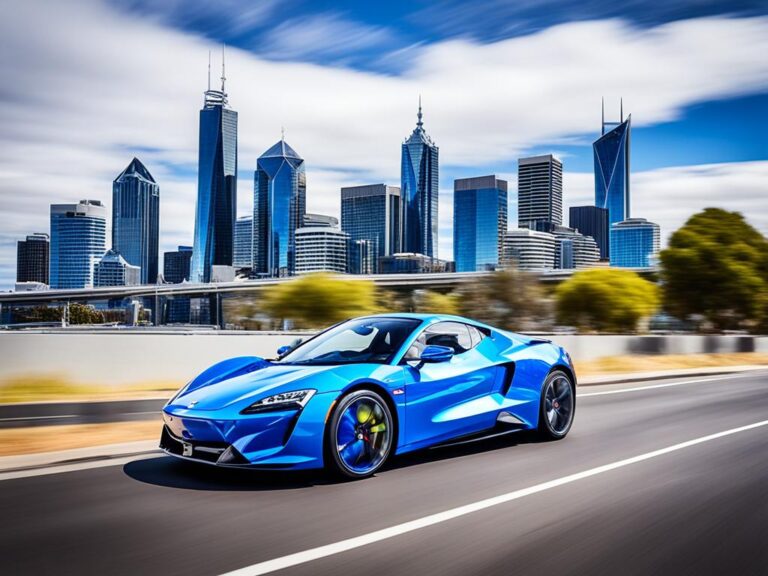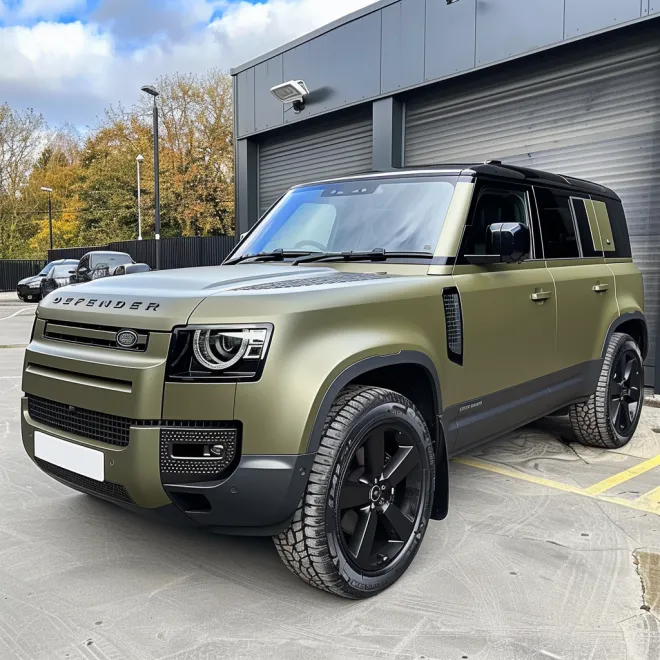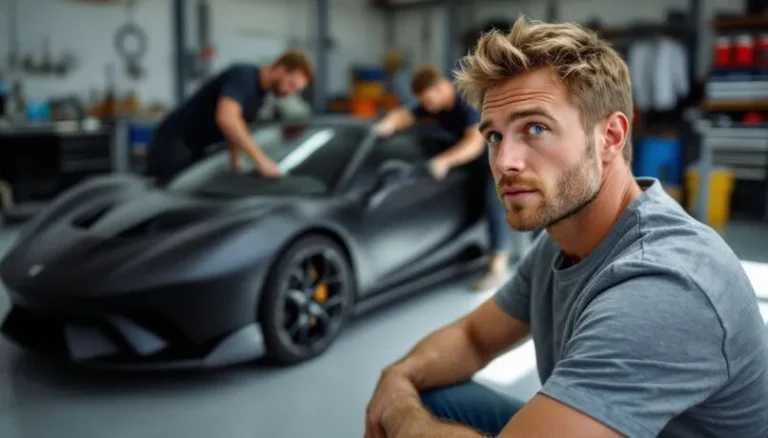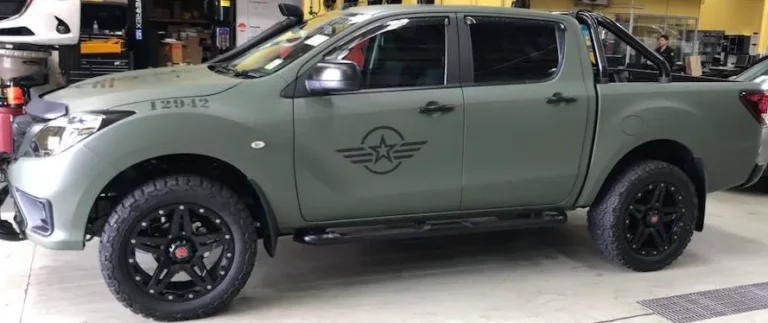Ultimate Guide to Car Wrapping: Everything You Need to Know
What is Car Wrapping?

Car wrapping is putting a vinyl film over a car. This changes its color, design, or texture without permanent work. It’s like giving your car a new look anytime you want! With Shamrock Vinyl Wraps, the idea is “It’s time to make it yours.” Think of it as customizing your ride with whatever colors or patterns you dream up.
This vinyl layer does more than just make your vehicle stand out. It also guards the original paint against UV rays and scratches. So, while you’re turning heads with your cool car design, you’re also keeping it safe from damage.
Choosing the right car wrap means picking from clear vinyl, colored, textured wraps – even ones for advertising.
How Does Car Wrapping Work?
After a thorough understanding of car wrapping, let’s proceed to discuss its execution. The procedure begins with ensuring a completely clean vehicle surface. This stage is crucial for successful adhesion of vinyl graphics without hindrances.
Following this, professionals engage tools such as a heat gun and a squeegee to accurately place the vinyl wrap on the car’s exterior. They aim for a perfect fit, eliminating any bubbles or ripples to attain an impeccable finish.
Materials like 3M vinyl or Avery cast vinyl are typically selected for their impeccable quality and endurance. These wraps serve the dual purpose of refreshing your vehicle’s appearance while simultaneously providing an added protective layer to maintain its aesthetic appeal for prolonged durations.
Given proper maintenance, these dynamic wraps can endure for a period spanning five to ten years! If you ever choose to alter or revert to your car’s authentic aesthetic, these wraps can be stripped off without causing any damage.
The act of wrapping your car equates to providing it a fresh exterior – identical form, yet a completely transformed ambiance.
What Materials are Used in Car Wraps?
Now that we know how car wrapping works, let’s talk about what goes into these wraps. The main ingredient is a material called polyvinylchloride polymer, or PVC for short. This stuff is pretty cool because it can change looks with different finishes.
You can pick from options like metallic, matte, gloss, and even color-changing vinyls to make your vehicle stand out.
Car wraps come in thin sheets as slim as 2 mil. Imagine that – only two thousandths of an inch between your car and the outside world! Companies like Car Wraps St Louis use high-quality 3M vinyl wraps to give cars a fresh look without harming the original paint job.
There are also special kinds of wraps such as carbon fiber wrap and chrome wrap if you want something unique like a camo pattern or shiny black chrome effect on your ride. Plus, there’s something called Paint Protection Film by 3M for those looking to protect their base paint while keeping their car’s good looks intact.
What Are the Different Types of Car Wraps?

After learning about the materials used in car wraps, let’s talk about the types. Car wraps come in many kinds. You can choose vinyl wraps for a new color or shine on your car. If you want something shiny, chrome wraps are cool.
For a tough look, carbon fiber wraps work well. Want to change colors? Color switch wraps let you do that easily.
Blackout wraps make parts of your car dark and sleek. Inside your car can get a new look too with interior wraps. To protect your ride, protective wraps keep scratches away. Each type offers ways to make your car stand out or stay safe on the road.
Why Choose Car Wrapping?
Moving from the various car wrap types to the rationale for selecting car wrapping, one should recognize that car wrapping provides a budget-friendly and personalized method to change your vehicle.
It presents a wide array of colors, finishes, and textures for customization. This approach not only revitalizes your vehicle’s appearance but also shields it from scratches, chips, and fading caused by environmental exposure.
Car wrapping offers limitless design options customized to personal style inclinations and is typically more economical than conventional paint jobs, while also offering added protection against UV rays, road debris, and severe weather conditions.
What Are the Benefits of Car Wrapping Compared to Painting?

Car wrapping boasts several advantages over painting. To start, vehicle wraps offer a wider array of colors and personalized designs, including unique finishes like matte or gloss wraps.
This allows for a fresh, distinctive look with endless design options. High-quality car wraps are also generally more budget-friendly than premium paint jobs. Vinyl wraps can endure for up to 10 years, while less expensive paint jobs may only last a couple of years, making them a long-lasting and economical choice for car enthusiasts.
In addition, the installation of wraps is faster than paint jobs, typically taking just a few days, which saves time and reduces the inconvenience of not having your vehicle for an extended period.
Another significant advantage is that vinyl wraps provide an additional layer of protection for your vehicle against environmental damage, ultimately extending the lifespan of both the wrap and the underlying paintwork – providing genuine value for your investment in your vehicle’s protection and maintenance.
How Does Car Wrapping Protect Your Vehicle?

Car wrapping provides a protective layer to shield your car’s original paint from UV rays and minor scratches. The vinyl wraps act as armor, safeguarding the vehicle’s paint from chips and abrasions.
These wraps can last for about 5 to 7 years with proper care. Plus, they do not cause any damage to the factory paint and can be removed without permanently altering the vehicle. A Paint Protection Film is often used for additional base protection.
Considering these benefits of car wrapping, it’s clear that this method offers an extra layer of defense for your vehicle. Now let’s explore the various customizations available with car wraps.
What Customization Options Are Available with Car Wraps?

Car wraps offer a wide range of customization options. This includes various colors, finishes, and textures such as matte, gloss, satin, chrome, and textured designs. The customization also extends to personalized graphics, logos, patterns—even specialty looks like carbon fiber or metallic styles are available.
For commercial or personal use, custom wrap design accommodates unique logos and designs while chameleon and temperature-activated wraps provide color-changing options.
These customization options allow car owners to transform their vehicles to match their unique preferences and stand out on the road with distinctive looks that suit their style.
How Much Does Car Wrapping Cost?
How Much Does Car Wrapping Cost?

Car wrapping costs vary based on the vehicle size. For sedans, the range is $2,500 to $6,000. Trucks vary from $2,800 to $6,500. Mini-vans fall in the $3,200 to $7,000 range and SUVs cost between $3,200 and $7,000.
Luxury cars can range anywhere from $3,800 to $8,500.
These costs are influenced by how much vinyl is needed for the specific type of vehicle. And keep in mind – high-quality wraps may come with a higher price tag but can also offer better durability and visual appeal.
What Factors Influence the Cost of Car Wrapping?

The cost of car wrapping is influenced by several factors:
- The type of material greatly impacts costs, with higher quality materials leading to increased expenses.
- Larger vehicles require more material and labor for the wrapping process, influencing the overall cost.
- The complexity of the design plays a significant role in determining pricing, as intricate designs incur additional costs.
- Professional installation costs vary based on the experience and expertise of the installer, impacting total expenses.
- The location and prevailing labor rates also influence the overall cost of car wrapping services.
- Additional custom design work and supplementary services add to the final expenses involved in car wrapping.
[Stop writing here.]
Is Car Wrapping a Cost-Effective Solution for Branding?
Car wrapping is a budget-friendly way to boost branding. It’s usually cheaper than traditional painting. Vinyl films can safeguard the original paint, preserving the vehicle’s value for branding purposes.
It provides flexibility in design and supports dynamic branding strategies by allowing changes without permanence. Wraps also find use in commercial trucking as mobile billboards and maintain the original paint’s condition, enhancing resale value.
This cost-effective solution offers versatility in design, making it an ideal choice for businesses looking to transform their vehicles into attention-grabbing brand assets while safeguarding their investment.
How Can You Find Affordable Car Wrapping Services?
To find affordable car wrapping services, you need to consider the cost. Vehicle wrap graphics can start at $350 for partial wraps with simpler designs, while full custom vehicle wraps typically range between $2,500 and $5,000.
For example, Car Wraps St Louis offers high-quality vehicle wrapping services in the St. Louis area and Shamrock Vinyl Wraps provides free estimates for their car wrapping services.
You can contact these companies via phone at (314) 866-4668 or through email, quote request forms, and shop visits to get a better understanding of the costs involved.
It’s important to note that prices may vary based on your location and specific design preferences. By reaching out directly to these providers, you can gather all necessary details about their pricing structure and available options tailored to your budget.
How to Prepare Your Vehicle for Car Wrapping
Preparing your vehicle for car wrapping is crucial to ensure a successful application and longevity of the wrap. Here’s how to prepare your vehicle for car wrapping:
- Thoroughly clean your vehicle to remove all dirt and grime, ensuring the surface is spotless.
- Inspect the vehicle’s surface for scratches and imperfections, making sure it is smooth and free from any blemishes.
- Repair any dents or damage on the vehicle before proceeding with the wrap installation.
- Remove any existing decals or stickers from the vehicle’s exterior to provide a clean canvas for the wrap.
- After washing, ensure the vehicle is completely dry before applying the wrap to prevent bubbling or adhesion issues.
- Conduct a final inspection of the surface to ensure it is ready for the process of wrapping the car.
Now, let’s explore how car wrapping works and what materials are used in this process.
What Steps Should You Take Before Wrapping Your Car?
Before you wrap your car, take these essential steps:
- Choose the right type of vinyl for the wrap, such as 3M, and plan for extra material to avoid running short during the wrapping process.
- Thoroughly inspect your vehicle for any problem areas and map out the surface to ensure a smooth wrapping process.
- Remove any obstructions like trim and handles that could interfere with the wrapping process.
- Clean the surface of your vehicle using a degreaser and 70% isopropyl alcohol to ensure proper adhesion of the vinyl.
- Measure the surface accurately and add extra length to vinyl pieces for trimming and tucking, preventing any gaps or uneven edges.
These steps are crucial in preparing your vehicle for a successful car wrap installation.
How Important is Cleaning and Detailing Before a Wrap?
Cleaning and detailing your car before a wrap is super important. It ensures the wrap sticks well and looks great. Any dirt or imperfections could mess up how long the wrap lasts and what it looks like.
Use 3M® Car Wash Soap or Meguiar’s Deep Crystal® Car Wash to clean, but stay away from solvents, oil-based cleaners, and kitchen/bathroom products on wraps. Keep it clean for a slick-looking ride!
Should You Repair Any Damage Before Wrapping?
Before wrapping your car, it’s essential to repair any existing paint damage like scratches and chips. The vinyl wrap won’t fix these issues, and they can become more noticeable once the wrap is on.
Addressing these damages beforehand ensures a smoother and flawless finish for the wrapped vehicle.
By repairing the damage first, you’ll prevent potential problems during installation and protect your car’s appearance in the long run. Quality matters – so starting with a well-maintained car sets the stage for a successful wrap that enhances both aesthetics and protection.
How is Car Wrapping Installed?
Car wrapping is installed through the following steps:
- The process starts with a design consultation to understand preferences and budget.
- Next, customers choose the vinyl type and finish for their vehicle during material selection.
- The vehicle’s surface is thoroughly cleaned, ensuring proper adhesion of the vinyl.
- Experienced technicians use tools like a heat gun, squeegee, and cutting blade to install the vinyl film smoothly, free from bubbles.
- Installation time can vary from a few hours to several days, depending on complexity.
What Tools and Equipment Are Needed for Installation?
What tools and equipment are necessary for installing a car wrap? Here’s what you’ll need:
- Squeegee: This tool is essential for removing air and bubbles during the application of the vinyl wrap.
- Gloves: PVC gloves protect the vinyl from oil, dirt, and fingerprints while handling the material.
- Heat Gun: A heat gun helps in conforming the vinyl to the curves and contours of the vehicle.
- Cutting blade (30°): This type of cutting blade is ideal for making precise cuts during installation.
- Knifeless Tape: It allows for clean cuts without damaging the underlying surface, ensuring a neat and professional finish.
These tools are crucial for a successful and precise installation process when applying a car wrap.
Can You Wrap Your Car Yourself or Should You Hire a Professional?
You can try wrapping your car yourself, but it’s not recommended unless you have experience and professional tools. DIY costs vary from $60-$1,500 for partial wraps and $300-$1,500 for complete wraps.
However, professional installation ensures a better finish and longer-lasting wrap. Poorly done wraps may look bad and damage the vehicle’s paint. For quality installations, certified technicians at Car Wraps St Louis are a good choice.
If you want to give your car a fresh look through wrapping, it might be worth considering professional help to ensure a high-quality finish that lasts longer without harming your vehicle’s paint.
What Are the Common Mistakes to Avoid During Installation?
Thinking about wrapping your car yourself? Here’s what you should consider to ensure a successful installation:
- Allowing Enough Time:
- Allow yourself plenty of time to avoid mistakes like creases, bubbles, or misalignments.
- Prioritizing Surface Preparation:
- Thoroughly clean and dry the car before installation to prevent issues like peeling or failed adhesion.
- Avoiding Excessive Stretching:
- Refrain from overstretching the vinyl, which can lead to visible lines or bubbles.
- Applying Heat Appropriately:
- Make sure to apply sufficient heat during installation to prevent lifting or bubbling of the vinyl.
- Careful Trimming:
- Ensure careful trimming of excess vinyl for a neat and professional appearance.
- Cultivating Patience:
- Installing a car wrap requires patience; rushing can lead to errors and a subpar outcome.
Taking heed of these considerations will help achieve a smooth and flawless car wrap installation.
How Long Does a Car Wrap Last?
Car wraps typically have a lifespan of 1 to 6 years, contingent on the type and finish. Gloss and satin wraps usually have a duration of 4-6 years, while matte wraps can last approximately 3-6 years.
On the other hand, chrome wraps have a shorter lifespan of 1-2 years and necessitate more maintenance. Furthermore, fluorescent wraps often endure less than a year when directly exposed to sunlight.
Routine maintenance can extend the life of a car wrap.
Now, let’s delve into the process of car wrapping and the materials utilized in car wraps.
What Factors Affect the Longevity of a Car Wrap?
Car wraps durability can be influenced by various factors:
- Quality of Materials: Premium vinyl films and durable adhesives play a crucial role in determining the lifespan of a car wrap.
- Professional Installation: Precise application by professionals ensures longevity and prevents premature wear.
- Environmental Impact: Factors such as UV exposure, extreme temperatures, and harsh weather conditions significantly impact the lifespan of a car wrap.
- Driving Habits: High mileage and aggressive driving can accelerate wear and reduce the lifespan of the wrap.
- Maintenance Practices: Proper maintenance including regular washing with mild detergent and gentle drying is essential to preserve the integrity of the wrap.
- Cleaning Chemicals: The use of harsh cleaning chemicals can negatively affect the durability and lifespan of the car wrap.
End of content.
How Should You Care for and Maintain Your Wrapped Vehicle?
Caring for and maintaining your wrapped vehicle is crucial to its longevity and appearance. Here are some essential tips:
- Regular Cleaning: Wash the vehicle once a week with a soft automotive sponge, using clear water to minimize water spots.
- Avoid Harsh Cleaning Methods: Steer clear of brush car washes, especially hand washing is preferred. Brushless car washes are safe alternatives.
- Tackle Stains Promptly: Clean stubborn stains like bird droppings and tree sap immediately to prevent damage.
- Protect from Sun and Pollutants: Prolonged exposure to sun and pollutants, especially on horizontal surfaces, can degrade the wrap.
End with “What Customization Options Are Available with Car Wraps?
When Should You Consider Replacing or Removing a Wrap?
A wrap older than five years might need replacement. Signs of air bubbles or wrinkles could mean improper installation and lead to early peeling. If the wrap shows significant wear or fading due to sun exposure, think about replacing it.
Harsh environmental conditions can shorten the lifespan, prompting removal or replacement. A damaged or peeling wrap should be removed to stop further deterioration. Regular inspections can help find issues before they get worse.
If you see air bubbles, wrinkles, significant wear, fading from sun exposure, harsh environmental conditions shortening its lifespan, a damaged or peeling wrap – you might consider getting rid of it.
What Are the Legal Considerations for Car Wrapping?
Legal considerations for car wrapping are crucial. Failure to comply with vehicle wrap regulations can lead to significant fines from regulatory authorities. These regulations vary by state and region, and some areas have specific requirements for advertising wraps on commercial vehicles.
It’s essential to adhere to local laws to avoid penalties, including making sure that wraps do not obstruct visibility or violate vehicle codes. Moreover, insurance providers may have specific guidelines regarding wrapped vehicles, adding another layer of importance to understanding the legal aspects of car wrapping.
Understanding these legal considerations is essential to ensure a smooth and compliant process when it comes to giving your vehicle a new look through wrapping. It also helps in safeguarding against potential financial penalties while navigating the constantly changing world of car wrapping regulations.
Are There Any Regulations Regarding Car Wraps in My Area?
Car wrap regulations vary by state and region. Some states may mandate permits or adherence to local advertising laws for commercial vehicle advertising wraps. Specific regions have limitations on color and reflectivity due to safety considerations.
To guarantee conformity, it’s crucial to research local laws or seek guidance from professional installers well-versed in regional regulations. Failure to comply can lead to fines and penalties.
It’s always essential to stay informed about vehicle wrap regulations in your area to steer clear of legal issues.
Next, let’s explore the significance of insurance regarding car wraps.
What Should You Know About Insurance and Car Wraps?
Car wraps act as a shield, protecting the original paint of your vehicle. Some insurance companies may cover wrapped vehicles. If you wrap your vehicle, tell your insurer and have all necessary documentation for claims.
Professional installation is vital for insurance purposes; it’s wise to ask about potential premium adjustments too.
Can Car Wrapping Affect Your Vehicle’s Resale Value?
Car wrapping can impact your car’s resale value. It may enhance the value when compared to a repainted car because it protects the original paint and adds a layer of customization.
However, some buyers might feel unsure about wrapped cars, making them question the vehicle’s history and scrutinize it more closely. The design and appeal of the wrap can also influence its impact on resale value, so it’s essential to consider this before making a decision.
The condition of the wrap material, how well it’s maintained, and overall quality will affect how much it contributes to your car’s resale value. Removing a car wrap also helps in preserving the original paint job which can positively impact its resale price.
Conclusion
Exploring the realm of car wraps can be exhilarating and offer a wide range of options to transform your vehicle. Whether you’re looking for a fresh, new look or extra protection for your car, car wrapping provides endless design possibilities.
With proper care and maintenance, a high-quality vinyl wrap can last for years, making it both cost-effective and customizable. Consider investigating this option to give your vehicle a unique touch that suits your style!
FAQs
1. What’s this “ultimate guide to car wrapping” all about?
Well, it’s a comprehensive guide that offers expert advice on everything you need to know about car wraps! It covers topics from the types of wrap materials like high-quality vinyl to how much vinyl wrap is needed for a full car.
2. Can I change the color of my vehicle with a wrap?
Absolutely! Car wraps come in various colors and finishes. So, whether you want a shiny metallic or matte black finish, there’s sure to be a perfect car wrap for your vehicle.
3. How long does a typical car wrap last?
With proper care and maintenance, your radikal wraps can last anywhere from three to five years! But remember not to damage the wrap while cleaning – it needs some love too!
4. Does wrapping offer any protection for my ride?
You bet! Wraps offer an extra layer of protection against scratches and UV rays – like giving your vehicle its own superhero cape!
5. Do I have options when it comes to design?
Wraps offer endless design possibilities, friend! From simple colour changes using colour change wraps, right down to complex patterns; the world of car wraps is wide open!
6. Can I remove the wrap without causing damage?
Good news here – quality vinyl wraps can be removed without damaging your original paint job at all! Just make sure you get professional help if you’re unsure… we don’t want any mishaps now do we?

